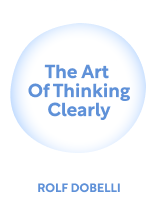

This article is an excerpt from the Shortform book guide to "The Art of Thinking Clearly" by Rolf Dobelli. Shortform has the world's best summaries and analyses of books you should be reading.
Like this article? Sign up for a free trial here .
What is action bias? Is being action-oriented a good thing?
Action bias is the tendency to take action rather than waiting for a better opportunity or more information. While the bias towards action is better than procrastination, it may lead to hasty and reckless decisions.
Here’s why bias towards action can sometimes do more harm than good.
Action Bias
For early humans, delaying action could mean death (for instance, if a predator approached). While this is much less often the case for modern humans, we still instinctively want to act in all situations. However, bias towards action causes problems in today’s complex world, when impulsive actions are more likely to cause problems than waiting and thinking things through. For example, impulsively deciding to invest in a fund without waiting and researching its likelihood of growth may lead to you losing money.
While the need for patience has grown, society’s tolerance of it hasn’t, Dobelli says. People praise those who take action, even if that action was reckless or hasty, while accusing those who choose to wait and gather information of cowardice. (Shortform note: Others argue that Dobelli is only partially right. Studies show that people praise leaders who quickly make positive decisions (like promoting someone) and see them as more trustworthy than those who wait. However, they see leaders who quickly make negative decisions (like cutting someone’s pay) as less trustworthy. Thus, society’s tolerance for quick decisions is situation-specific, rather than uniform as Dobelli implies.)
| Action Bias and Manipulation While Dobelli acknowledges that action bias causes problems in the modern world, he doesn’t cover a specific issue that can have major consequences: People, or even governments, manipulating action bias to fulfill their own goals. In his book Factfulness, Hans Rosling argues that salespeople, politicians, and activists manipulate action bias by using time limits and worst-case scenarios to spark panic. In the wake of this panic, they encourage people to take drastic actions rather than waiting to gather more information—in other words, to give in to action bias. Simultaneously, they withhold information from the public because it’s easier to inspire panic when the public has little information or experience. Panicking and ill-informed, the public makes hasty decisions that can be disastrous. For example, say a politician’s running for president. He encourages people to vote for him by saying war with another country is inevitable—a worst-case scenario— and he can mitigate the damage by attacking first. He presents the other country as highly dangerous and emphasizes the need for immediate response. He also exaggerates the consequences of not acting—for instance, that their country’s way of life will be destroyed. This sparks panic among the public. The politician then limits the distribution of any opposing information, so the public can’t allay this panic through research. Thus, the panicking public votes the politician into office, no matter how unjustified or disastrous doing so actually is. No matter the source, overcoming bias towards action is important. Dobelli doesn’t explain how to do so, but Rosling suggests the following tips: 1. Collect information. Examine all facts and evidence before jumping to conclusions. 2. Don’t panic. Remember that most problems don’t have a “now or never” deadline. 3. Mind probability. Focus on the most probable scenario instead of the worst case scenario. |

———End of Preview———
Like what you just read? Read the rest of the world's best book summary and analysis of Rolf Dobelli's "The Art of Thinking Clearly" at Shortform .
Here's what you'll find in our full The Art of Thinking Clearly summary :
- A detailed look at the most common logical fallacies that inhibit decision-making
- How to recognize and overcome these fallacies to make better decisions
- Why you value things for arbitrary reasons






